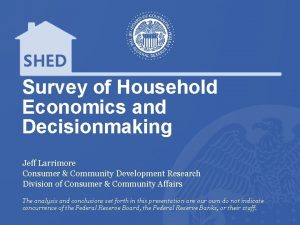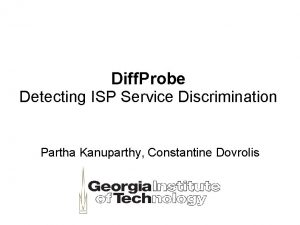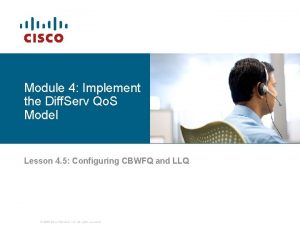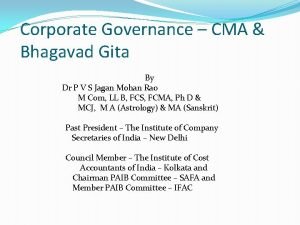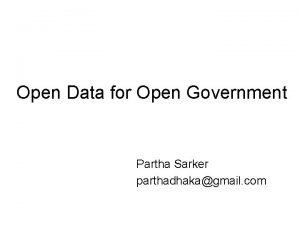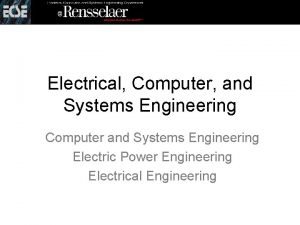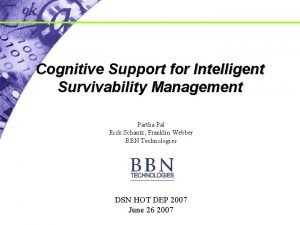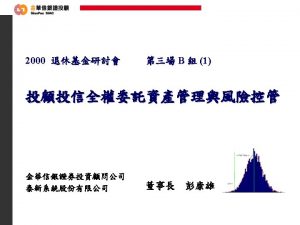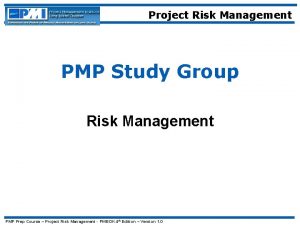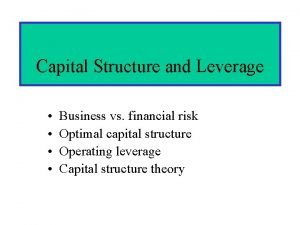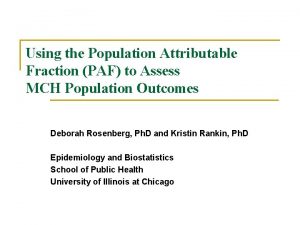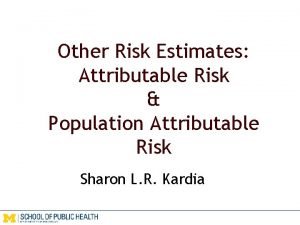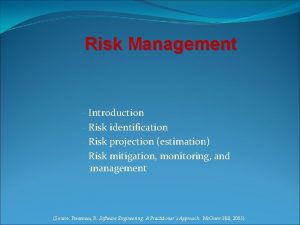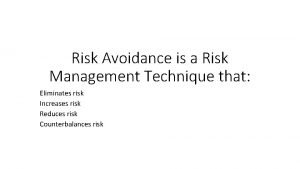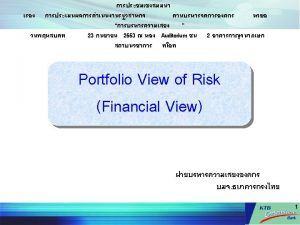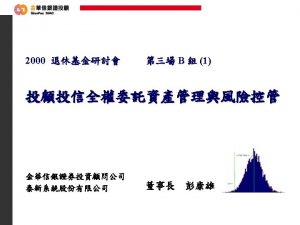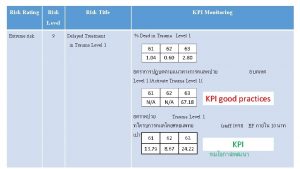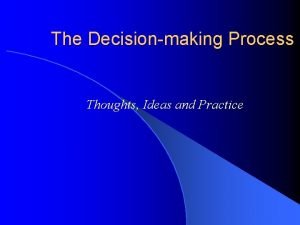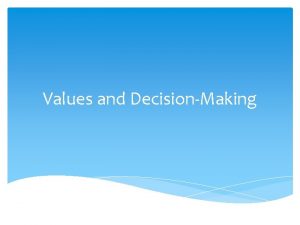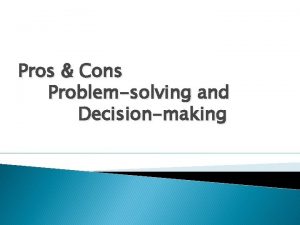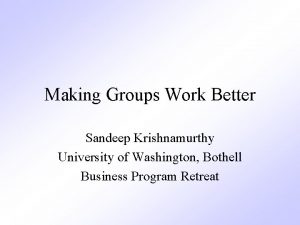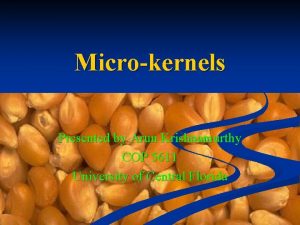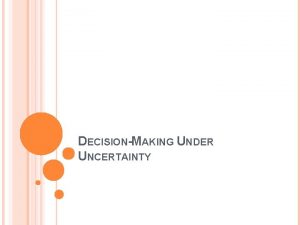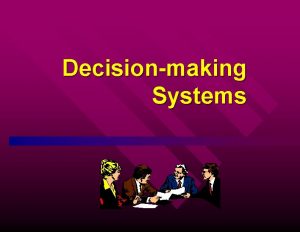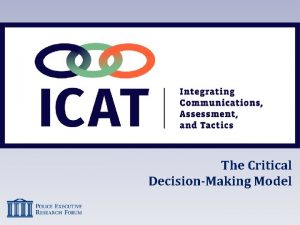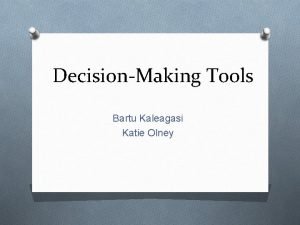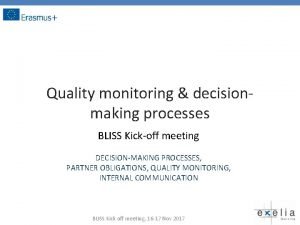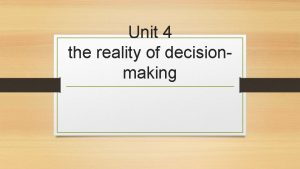Seminar in DecisionMaking and Risk Partha Krishnamurthy University

















- Slides: 17

Seminar in Decision-Making and Risk Partha Krishnamurthy University of Houston

Goals for the Seminar ¨ Lower the microscope on how decisions are made. ¨ Increase conscious decision-making. ¨ Increase sensitivity to the various facets of the decisionmaking process.

What is a Decision? n Your thoughts on key characteristics of decisions. n What makes a decision, a decision?

Elements of Decision-making n Question of decision options n Question of outcomes for the options n Question of preferences for the outcomes n Question of decision rule ¨ Decisions about the decision-making process

Core of Decision Making: Logic of Consequence* n Choice process is consequential and preference-based ¨ Consequential n ¨ Choice of option is based on likely consequences. Preference-based n Consequences are evaluated based on personal preferences. *Source: March and Heath, 1994

The Process of Decision-making n The process of: ¨ ¨ ¨ Recognizing decisions, and courses of action. Gathering information for each course of action. Combining information to form overall impressions of each course of action.

Decision Making and Risk n No risk, no decision, right? n Risk in decision making ¨ Options n ¨ Preference for consequence n n Maximize short-term market share or profit to maximize share-holder wealth? Suppose you had to choose between a powerful-but-heavy laptop versus a less powerful but ultra-light laptop, ¨ ¨ n A choice between stocks versus bonds. Is there risk here? Is this a decision? Where is risk in this decision?

Perspectives on Decision Making n Normative n n Descriptive n n How decisions should be made, i. e. , what makes for a good versus bad decision. How decisions are made. Prescriptive n What decision making process should be interfered with to make the optimal decision.

What Makes for a Good Decision?

Mutual Fund Choice n Suppose, an investment advisor gives you the following two options to invest in: ¨ ¨ Fund A: Fund B: 7. 8% with volatility of about ± 0. 6% 11. 7% with volatility of about ± 8% Which Fund will you choose? n What does this mean for decision-making? n n In the end, it is a matter of preferences. We can only judge whether the decision process in the light of the preferences.

Coin Toss n Two biased coins. Coin A: p(heads) =. 45 Coin B: p(heads) =. 55 n You can choose the coin, and the call. If you call correctly, you get 100, 000 tax free, 0 otherwise. n You choose coin B, and call “heads” and it lands “tails” up. n How good was your decision to choose coin B? Clearly Wrong 1 ---2 ---3 ---4 ---5 ---6 ---7 Source: Russo and Schoemaker, Winning Decisions Clearly Right

Product Development n A small business has to choose between two technologies, A or B, to incorporate in the planned new product development and launch. n Based on all information, technology A has a 52% chance of success and B has 48%. n If they choose the correct technology platform, they will get net after tax profit of 7. 5 m for the year, and nothing if they fail. n They choose technology A, and the product fails, and a competitor chooses technology B, and their product succeeds. n How good was the decision to choose technology A? Clearly Wrong 1 ---2 ---3 ---4 ---5 ---6 ---7 Clearly Right Source: Russo and Schoemaker, Winning Decisions

What was your response? n Coin toss? ¨ n Why? Product launch? ¨ Why?

What Influences Decision Outcomes Executing the Decision Outcome Decision Chance Good outcomes do not imply good processes, nor do good processes guarantee good outcomes. Good processes give the best odds of good outcomes. Source: Russo and Schoemaker, Winning Decisions

Job Profiles n Imagine that you are looking to make choices on whether to apply for an on-campus job. n Companies vary on the following dimensions: ¨ Location: ¨ ¨ Compensation ¨ ¨ Very Large Metro Small Metro Slightly Above Industry Average Slightly Below Industry Average Career Path ¨ ¨ Accelerated Industry Standard

Job Preference Questionnaire n For the attributes of location, compensation, and career path…. n Please indicate much importance did you assess to each of them? n n Complete questionnaire 1, put you ID number, return it. Complete questionnaire 2, put your ID number, return it.

Session 1 – Take-aways n Decision making is based on consequentiality and preference. n Risk and decision-making go hand-in-hand. n Good decision-making involves good decision process more than outcome.
 Survey of household economics and decisionmaking
Survey of household economics and decisionmaking Partha kanuparthy
Partha kanuparthy Partha kanuparthy
Partha kanuparthy Partha kanuparthy
Partha kanuparthy Yuktahara viharasya
Yuktahara viharasya Partha sarker
Partha sarker Partha dutta rpi
Partha dutta rpi Partha kanuparthy
Partha kanuparthy Market risk assessment
Market risk assessment Krishnamurthy viswanathan
Krishnamurthy viswanathan Sailesh krishnamurthy
Sailesh krishnamurthy Arvind krishnamurthy
Arvind krishnamurthy Residual risk and secondary risk pmp
Residual risk and secondary risk pmp Business vs financial risk
Business vs financial risk Relative risk calculation
Relative risk calculation Measure of association formula
Measure of association formula Risk projection attempts to rate each risk in two ways
Risk projection attempts to rate each risk in two ways Risk avoidance insurance
Risk avoidance insurance
